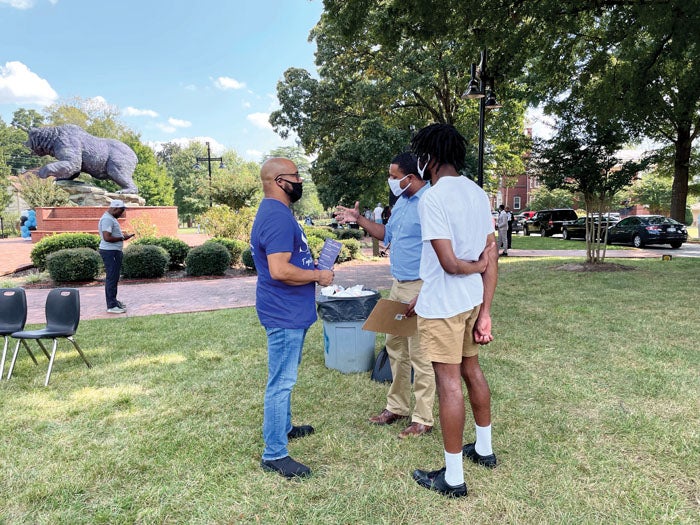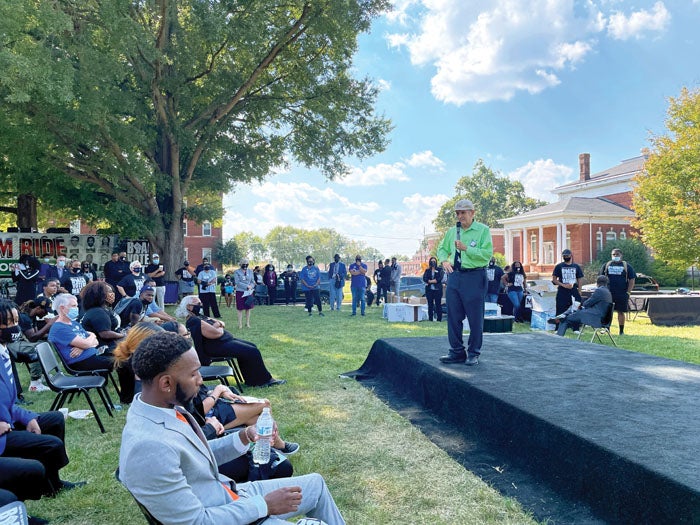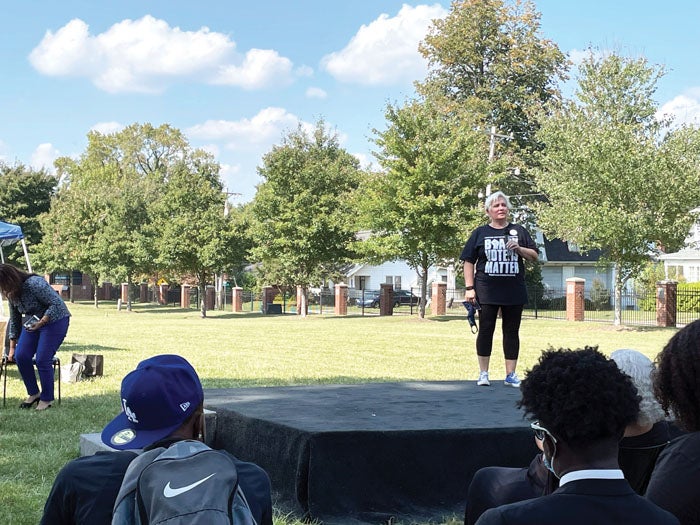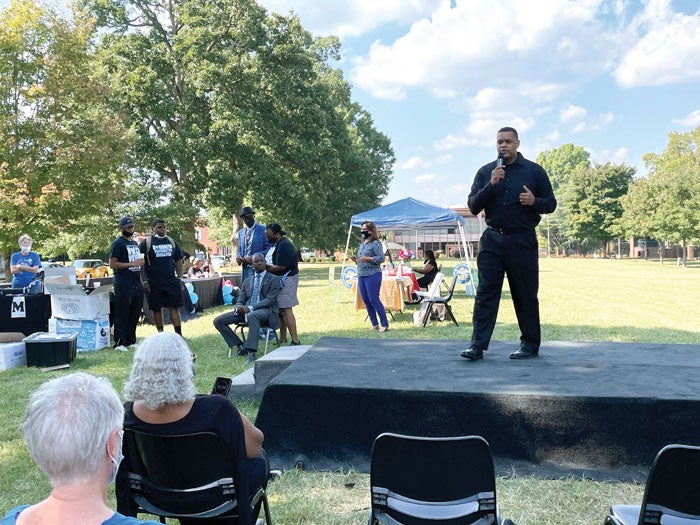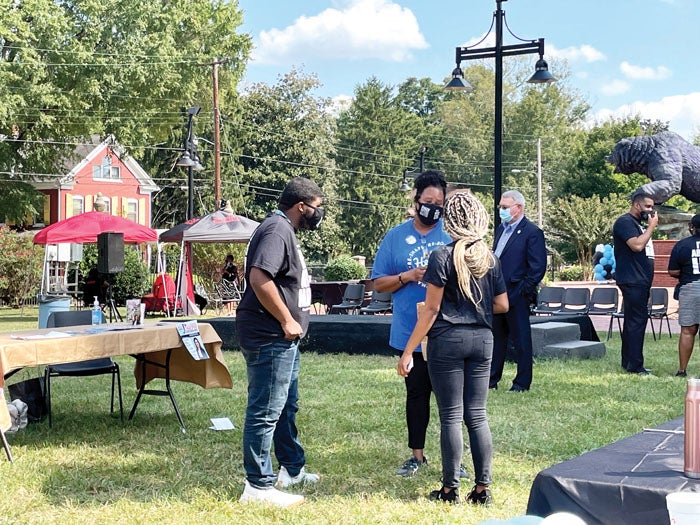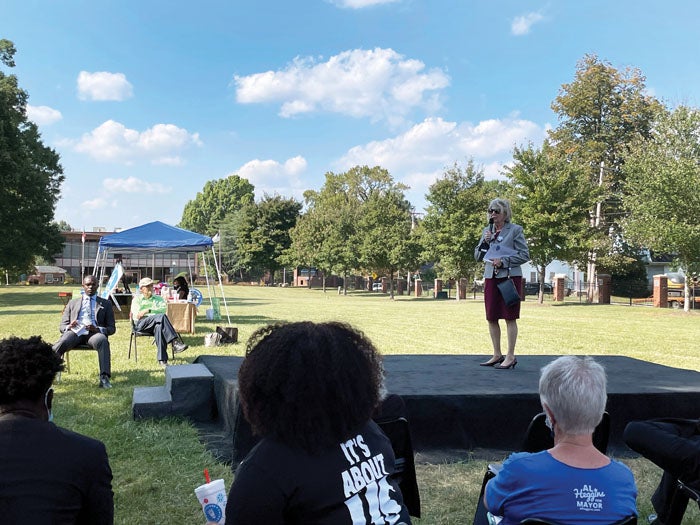Salisbury council candidates talk with Livingstone students during Black Voters Matter HBCU Tour
Published 12:05 am Thursday, September 30, 2021
By Natalie Anderson
natalie.anderson@salisburypost.com
SALISBURY — Candidates for the Salisbury City Council on Wednesday addressed a few dozen Livingstone College students during the Black Voters Matter HBCU Tour.
Students and Salisbury voters gathered on the front lawn of the campus Wednesday decked out in Black Voters Matter apparel and black clothing. Culinary students also provided chicken and shrimp teriyaki while music played. A booth was set up for students to register to vote.
Livingstone College’s Student Government Association facilitated the candidates forum, which allowed each of the city’s nine council candidates a few minutes to address voters on how their election could benefit the city. SGA President Justin Wade facilitated the discussion.
Jonathan Barbee, a 23-year-old who unsuccessfully ran for the RSS Board of Education in 2020, cited the need to address gentrification and crime in Salisbury in addition to economic development near the Mid Carolina Regional Airport. He first got involved with local politics as a student at Catawba College, and he’s currently a member of the North Carolina Institute of Political Leadership fellowship program.
Barbee said he actively goes to communities to speak with residents about their needs. While the city has been moving forward, there’s still work to be done.
“Just because you have a brick does not mean it lays a brick,” he said.
Jessica Cloward, broker for Lantern Realty and Development in downtown Salisbury, said her hope in being elected is to increase unity. Cloward cited homelessness as one issue she’s passionate about. She also wanted to see a Chamber of Commerce-type organization for college students to find additional opportunities and see students get more involved on boards and commissions.
“Part of my plan for the city is to really be the light in the darkness, to let everyone in the community see that we are working together as one,” Cloward said. “I want to see the unity.”
Nalini Joseph, a district administrator of the Guardian ad Litem Program, challenged students to ask themselves what they can do as a “responsible and caring citizen and educated young person” to make “our great city even greater” instead of talking about herself. Her call for biology students was to stay the course and go into medical and pharmacological fields as “America needs more physicians of color.” Additionally, those in business need to tell city leaders what they need to set themselves up for success in Salisbury, she added.
“We need students like you to succeed and embark upon careers that will make our city and our country prosperous,” Joseph said. “You want a City Council person who will work with you to obtain spiritual, financial and emotional success … You want a City Council person who will give you the best chance at giving you the competitive edge that you need to be successful in the workforce.”
Harry McLaughlin Jr., owner of McLaughlin’s Grocery on West Monroe Street, cited his experience protecting U.S. presidents, vice presidents and foreign dignitaries as a Secret Service agent for 15 years, which he said could help “bridge the gap” between the local community and the city and law enforcement.
McLaughlin said he wants to make it easier to start a business and have a hub where students can obtain skills and build their resumés. That could include businesses that provide opportunities for students in the field of information technology, business and law, he said.
David Post, who is seeking re-election to a third term, said two of his accomplishments that have meant the most include changing the city’s protest laws in addition to the establishment of the KIVA program, which partners with Self-Help Credit Union to help women and minorities obtain microloans to launch businesses. Post said the KIVA program is part of the reason he decided to run again, and the success of the protest law changes were seen during the racial justice protests in the summer of 2020 following the death of George Floyd.
Post also spoke about his upbringing as the grandson of Jewish immigrants. He said his family taught him that obtaining an education and making money were keys to success in the face of discrimination.
“If you make money, a lot of the prejudices we face in society go away,” Post said. “There’s a lot of access in this society if you have a couple of bucks in your pocket.”
Tamara Sheffield, who is seeking re-election to a third term, spoke about her accomplishments in helping to establish an annual Pride festival and the passage of the city’s nondiscrimination ordinance in June. She said the last year taught her much more that she thought she already knew, and that anyone who didn’t learn anything “really missed out.”
She called on voters to hold council members accountable in ensuring issues that come before them bring equity for everyone.
“It’s about embracing our community partnerships,” Sheffield said. “If we don’t know what you want, we can’t make it happen. And we got to get that economic development so you can get your great education here at Livingstone College and you stay here.”
Sheffield is an account manager for PepsiCo’s Frito-Lay branch and was the first openly gay candidate to win election to the city council when first elected in 2017.
Anthony Smith, senior pastor at Mission House Church, spoke about his years of being an activist, adding that he’s risked his life with friends, been arrested and tear gassed in the name of justice and issues important to his community. Though Smith said he loves the energy that comes with protesting and the opportunity to challenge power, his efforts now shift to “changing the rules” on a policy level. He spoke about his platform’s acronym ACES, with “A” standing for abundance, “C” standing for cooperation, “E” standing for equity and “S” standing for social innovation.
“If we don’t shift how power and resources are distributed in this community, we’re going to maintain the same problems that we have,” Smith said.
Among those is a rise in homicides, which he said stems from violence — a personal issue for him. Smith said efforts should be put into addressing the root causes of violence, known as the cure violence model, which is used across the nation and employs community-driven policies in public safety operations.
“Oftentimes when people talk about crime and violence, the first thing they say is, ‘I support the police.’ That’s great. I support the police, too,” Smith said. “But supporting the police is not the only way to address violence in your community.”
Mayor Karen Alexander said she prepared remarks but decided to instead detail her history with Livingstone College, which includes her work as an architecture on the Hood Theology Seminary building in addition to Livingstone’s Andrew Carnegie Library and Ballard Hall.
She also cited her support for various grants, including a series of grants amounting to $2 million that she worked with federal lobbyists to obtain with Rep. Ted Budd, the Republican representing the 13th Congressional District. Additionally, she supported a $500,000 grant that will allow for the preservation of the historic Monroe Street School across from Livingstone College.
“My focus is a servant leader. I don’t do a lot of talking, but I do a lot of work,” Alexander said.
Mayor Pro Tem Al Heggins, who is challenging Alexander in the race for mayor, said the city must live up to its commitment in 2019 in passing the Resolution of Reconciliation and provide annual reports of the city’s equity efforts. She said being an elected leader is about being a public servant, which requires listening to the voices and taking on the deliberate responsibility to look at the table and ask who’s not there.
“Sometimes when you’re running for political office, people are going to say all kinds of stuff about you,” Heggins said. “You look on Facebook, you look in the newspaper, you look on Twitter and Instagram and you’ll see all kinds of stuff that’s just not true. But what I want to tell you today is that it’s not about what people say about you, it’s what you answer to.”
Heggins cited her past experience as an officer in the U.S. Army and a director of Human Relations in High Point, and said she supported “community succession planning,” which means she’s “not sitting in the mayor’s office” but instead is out on the streets doing the work.
“It’s not so much about the history that you make for yourself. It’s about the story that you’re making for the people coming behind you,” Heggins said.
Heggins made history in 2017 when she was the first Black woman elected to city council, and made history again when appointed the city’s mayor in 2017.
Heggins previously served as associate vice president of student affairs at Livingstone College, and Post taught in the business school during the 1970s.
The forum also featured remarks from Dr. Richard Watkins, a Democrat from Greensboro who’s seeking the open U.S. Senate seat in 2022 after Sen. Richard Burr retires. Watkins is a doctor of immunology with a specialty in virology. He called on voters to elect the state’s first Black senator, scientist and millennial who is also the product of a historically Black college — Fayetteville State University.
“Of course, it has to be in North Carolina. Because you can’t even spell ‘science’ without ‘NC,'” Watkins said. “I came from slaves, who had masters. Now I have my Ph.D., which ironically puts me above the masters. We have to recognize the times where we are, the times we are in, where we’ve come from and where we must go because we stand on the shoulders of giants.”
Contact reporter Natalie Anderson at 704-797-4246.


